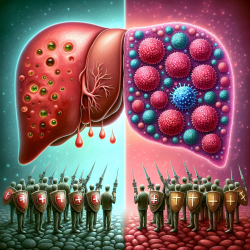Hepatocellular carcinoma (HCC) is a primary liver cancer that can arise from various causes, including viral infections and non-viral factors like non-alcoholic steatohepatitis (NASH). Recent research has highlighted significant challenges in treating NASH-driven HCC with immunotherapy, particularly therapies targeting programmed death-1 (PD1) and its ligand PDL1.
The Role of CD8+ T Cells in NASH-Driven HCC
The study "NASH limits anti-tumour surveillance in immunotherapy-treated HCC" provides insights into the mechanisms by which NASH affects immune responses. In NASH-affected livers, there is a progressive accumulation of exhausted CD8+PD1+ T cells. These cells, instead of enhancing immune surveillance and combating tumors, contribute to tissue damage and promote tumor growth.
In preclinical models, the administration of anti-PD1 therapy increased the presence of activated CD8+PD1+ T cells within tumors but did not lead to tumor regression. This suggests that these T cells are not effectively executing their immune surveillance roles. Instead, they may be contributing to the progression of HCC.
Implications for Practitioners
For practitioners working with patients suffering from NASH-driven HCC, understanding the unique immune environment is crucial. Here are some considerations:
- Patient Stratification: It is essential to stratify patients based on the underlying cause of their liver disease. Those with non-viral HCC, particularly NASH-driven cases, may require different therapeutic approaches compared to viral-induced HCC.
- Therapeutic Approaches: Given the limited efficacy of PD1/PDL1 inhibitors in NASH-driven HCC, exploring alternative treatments or combination therapies that address the unique immune landscape may be beneficial.
- Further Research: Encouraging further research into biomarkers that predict response to immunotherapy can help tailor treatments more effectively. Understanding the role of CD8+ T cells in promoting rather than inhibiting tumor growth could lead to novel therapeutic targets.
The Path Forward
The findings underscore the need for personalized medicine approaches in treating HCC. By focusing on the specific etiology of liver damage and its impact on immune function, practitioners can better align treatment strategies with patient needs.
To delve deeper into this research and explore potential strategies for improving treatment outcomes in NASH-driven HCC, practitioners are encouraged to read the original research paper: NASH limits anti-tumour surveillance in immunotherapy-treated HCC.










